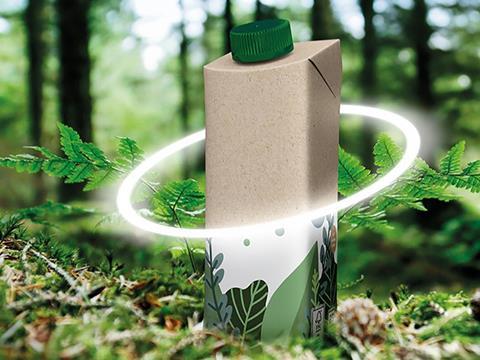
SIG has announced its intent to develop a full-barrier, aluminium-free aseptic packaging structure with at least 90% fibre content by 2030, aiming for an interim target of at least 85% by 2025.
In a bid to ensure that its packaging is completely recyclable anywhere in the world, even in markets with less established recycling infrastructure, SIG is set to increase the FSC-certified fibre content and expand its aluminium-free solutions.
It also seeks to remove more carbon from the atmosphere than is emitted during the life cycle of its packaging – as well as to make its packaging from endlessly renewable or recycled materials.
The company emphasises the finite supply of Earth’s resources and the limited capacity of the planet to absorb waste. In response, it encourages both the packaging industry and society at large to strive for a circular economy, with increasing demand for sustainable solutions reportedly creating an opportunity for food and beverage companies to optimise their packaging designs.
“Our carton packs have a low energy intensity, are produced with 100% renewable electricity, and consist predominantly of renewable resources from the forest,” said Samuel Sigrist, CEO at SIG. “Now we want to take this even further by increasing collection and recycling of cartons through existing beverage carton recycling systems, and via paper streams.
“Increasing the proportion of fibre content in aseptic cartons opens this opportunity and aligns with the wider trend towards paperisation in the packaging industry. The FSC-certified renewable paperboard used in our packs ensures that we are promoting responsible forestry practices that prioritise biodiversity conservation.”
The announcement comes after SIG’s new production plant for aseptic carton packaging entered operations in Queretaro, Mexico; and, earlier this year, the company announced that 100% of the aluminium used in its aseptic carton packs is set to be certified through the Aluminium Stewardship Initiative (ASI) in the hopes of lowering emissions and optimising the efficiency of its supply chains.
Additionally, Luoro brand Paperdent is distributing its alcohol-free mouthwash in Elopak’s D-PAK paperboard carton – a solution said to use over 80% less plastic than conventional mouthwash packaging.
If you liked this article, you might also enjoy:
The Lidl approach to packaging sustainability
How did Brazil achieve its 100% aluminium can recycling rate – and can it be replicated in the EU?
Experts have their say on the EU’s Packaging and Packaging Waste Directive revisions
A deep dive into the most important packaging sustainability trends and solution














No comments yet